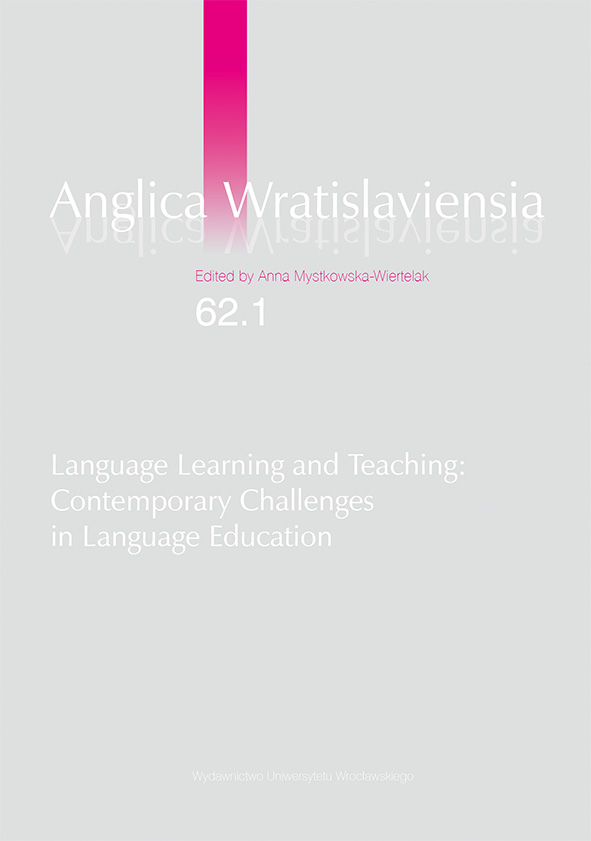

Articles

This study examines how forty-eight Polish in-service language teachers position them- selves through their discourse during professional promotion examinations for teachers. The data were collected via field notes concerning the participants’ narratives and their responses to the questions asked by the members of the examination commissions. Of particular interest were the teachers’ three self-positions: the unique self, the ideal self, and the fearful self. The analysis of the datarevealed that, apart from the emergence of the references to the three positional identities, each of these self-positions could be further subdivided into other self-position constructions which shed light on what language teachers believe would be appreciated by the examiners under the circumstances. The significance of the study lies in its focus on in-service language teachers’ discourses obtained in a particular professional situation— teacher promotion examinations— to which access is rather rare. The findings shed further light on the connection between teacher identity, teacher emotions, and teacher agency and offer implications for in-service language teachers, teacher ex- aminers, and teacher educators.
Badia, A. and E. Liesa. 2022. “Experienced Teachers’ Identity Based on Their I-Positions: An Analysis in the Catalan Context.” European Journal of Teacher Education 45.1. 77–92.
Bakker, A. B. and E. Demerouti. 2013. “The Spillover-Crossover Model.” In: Grzywacz J. G. and E. Demerouti (eds.). Current Issues in Work and Organizational Psychology. New Frontiers in Work and Family Research. New York: Psychology, 55–70.
Collie, R., et al.. 2020. “Examining the Unique Roles of Adaptability and Buoyancy in Teachers’ Work-Related Outcomes.” Teachers and Teaching: Theory and Practice 26.3-4. 350–64.
Dewey, J. 1933. How We Think: A Restatement of the Relation of Reflective Thinking to the Educative Process. Boston: Heath & Co.
Dӧrnyei, Z. and M. Kubanyiova. 2014. Motivating Learners, Motivating Teachers. Cambridge: Cambridge UP.
Gallardo, M. (ed.). 2019. Negotiating Identity in Modern Foreign Language Teaching. Cham: Palgrave Macmillan.
Gilgun, J. F. 2020. “Writing up Qualitative Research.” In: P. Leavy (ed.). The Oxford Handbook of Qualitative Research. Oxford: Oxford UP, 985–1011.
Gmelch, W. 1983. “Stress for Success: How to Optimize Your Performance.” Theory into Practice 22.1. 7–14.
Harmer, J. 2001. How to Teach English. Harlow: Longman.
Harrison, A. K. 2020. “Ethnography.” In: P. Leavy (ed.). The Oxford Handbook of Qualitative Research. Oxford: Oxford UP. 329–58.
Kayi-Aydar, H. 1919. Positioning Theory in Applied Linguistics. Cham: Palgrave Macmillan. Kim, J.-I. 2017. “Issues of Motivation and Identity Positioning: Two Teachers’ Motivational Practices for Engaging Immigrant Children in Learning Heritage Languages.” International Journal of Bilingual Education and Bilingualism 20.6. 638–51.
Kubanyiova, M. 2010. “Possible Selves in Language Teacher Development.” In: Dӧrnyei Z. and E. Ushioda (eds.). Motivation, Language Identity, and the L2 Self. Bristol: Multilingual Matters, 314–32.
Markus, H. R. and P. Nurius. 1986. “Possible Selves.” American Psychologist 41. 954–69.
Miyahara, M. 2015. Emerging Self-Identities and Emotion in Foreign Language Learning. Bristol: Multilingual Matters.
Nagatomo, D. H. 2012. Exploring Japanese University English Teachers’ Professional Identity. Bristol: Multilingual Matters.
Norton, B. 2013. Identity and Language Learning: Gender, Ethnicity and Educational Change. Bristol: Multilingual Matters.
Oyserman, D. and H. R. Markus. 1990. “Possible Selves and Delinquency.” Journal of Personality and Social Psychology. 59. 112–25.
Paikeday, T. M. 1985. The Native Speaker is Dead! Toronto: Paikeday.
Preston, M. 2019. “‘I’d Rather Beg for Forgiveness Than Ask for Permission’: Sexuality Education Teachers’ Mediated Agency and Resistance. “Teaching and Teacher Education 77. 332–40.
Rushton, E. A. C., et al. 2023. “Understanding Teacher Identity in Teachers’ Professional Lives: A Systematic Review of The Literature.” Review of Education 11.2. 1–52.
Schӧn, D. A. 1983. The Reflective Practitioner: How Professionals Think in Action. New York: Basic Books.
Shirley, D. and A. Hargreaves. 2023. The Age of Identity. Sage Publications.
Szumiec, M. 2017. System awansu zawodowego nauczycieli. Kraków: Impuls.
Tripp, D. 1993/2012. Critical Incidents in Teaching: Developing Professional Judgement. London: Routledge.
Turner, M. 2017. “Integrating Content and Language in Institutionally Monolingual Settings: Teacher Positioning and Differentiation.” Bilingual Research Journal 40.1. 70–80.
Ur, P. 2012. A Course in English Language Teaching. Cambridge: Cambridge UP.
Ushioda, E. 2011. “Motivating Learners to Speak as Themselves.” In: C. Murray, X. Gao and T. Lamb (eds.). Identity, Motivation, and Autonomy in Language Learning. Bristol: Multilingual Matters, 11–24.
Van Langenhove, L. and R. Harré. 1999. “Introducing Positioning Theory.” In: R. Harré and L. Van Langenhove (eds.). Positioning Theory: Moral Contexts of Intentional Action. Oxford: Blackwell, 14–31.
Werbińska, D. 2022. In-Service Language Teachers’ Examination Discourses: Interpretative Repertoires and Positioning. Słupsk: Wydawnictwo Naukowe Akademii Pomorskiej w Słupsku.